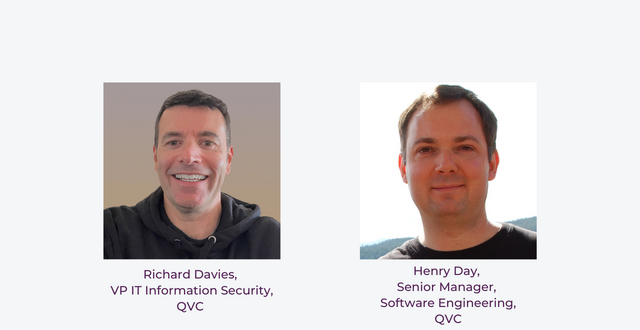
Real change takes everyone — and allies are one of the key drivers to inclusivity in the workplace. By publicly supporting and advocating for women they can help to dismantle systemic structures of inequality and create inclusive environments where everyone can flourish. In celebration of International Men’s Day, we talk to Qurate Retail Group leaders Richard Davies VP IT Information Security and Henry Day, Senior Manager, Software Engineering about why allyship has been such an important part of their careers and the active role they play in levelling the playing field for everyone in their teams

What key things have you learned about allyship throughout your career?
HENRY: Being an ally is about actions and it’s taken me some time to realise that having good intentions isn’t enough. Allyship is about making the right interventions, not necessarily in a big way but just speaking up in meetings, ensuring all voices are heard and also guiding the hiring process to make sure that we are getting access to all of the talent. I want to be able to bring the best people into the organisation and it gives me real pleasure to see people with aptitude blossom. There is no reason why that shouldn’t be women and men in equal number.
RICHARD: I believe that I am in a privileged position and as a result I have an obligation to pay it forward and help others to progress. I started my career in the early ‘90s and pretty much everything has changed in technology since then, but there is still a huge disparity in the number of women coming into the profession. I want to understand why we are missing that opportunity? I’ve interviewed a lot of people and made a lot of hiring decisions in my career and what I’ve realised only fairly recently is that maybe I’ve been looking for the wrong things. I’ve always been looking at who would fit in with the team or our company and actually what I should be looking for is who can add to our team and bring a different perspective and experience.
What do you consider needs the biggest drive around awareness?
HENRY: There’s a general portrayal of software development as just being about writing code, but that’s only a small part of it. Communication is critically important in terms of coordinating and collaborating with other teams, and that becomes increasingly important the more senior you get — it is one of the factors that determines whether you’re successful or not in technology. Getting that across to those who are thinking about coming into the sector and enabling them to see what it actually is about more broadly may attract more women into the profession.
RICHARD: There are some exceptionally strong, talented women in tech and I’ve been lucky enough to work with a number of them — the CIO of Qurate Retail Group is one — but they’re still in the minority. So it’s about trying to raise that awareness in the team around the fact that the shortage of women in tech is still a problem.
What changes can greater male allyship create in your teams?
RICHARD: We’re all on a journey to understanding more about DE&I and at different places of understanding, with different backgrounds. We have a lot of ground to make up and if males in positions of leadership are not talking about this and not acting it’s just going to take longer to address the imbalances. That’s part of the reason I talk about it. There’s another selfish reason as well: in cybersecurity, there’s a shortage of qualified people and the market is very competitive. We need to build talent pipelines and we need to tap into all demographics across the UK to do so. We can all sit back and say we want to be good people, but it needs more than that, it takes action, especially from those who have benefited from some of the inequality, even if not deliberately.
HENRY: If you move into technology without a technology background there is a hurdle to gaining those technical skills. People have moved across from product teams or customer service and brought with them great knowledge of how the business operates, which has made them ideal to test the software we’re developing. But we need to do far more around continuing our investment, acknowledging those who maybe lack opportunities/ face hurdles and offering those people support and a route into technology and further development.
How have you made a difference as a leader and as a male ally?
RICHARD: If my directors or managers are looking to make hiring decisions, and coming to me with candidates, I will always ask, ‘Why aren’t we seeing more qualified women candidates in our applicant pool?” Asking questions and promoting awareness among a team is a crucial part of being an ally. So too is challenging unconscious bias. As a leader, encouragement and particularly around taking the next step is another important area — and sometimes just listening too, to read between the lines and pick up on barriers you might not be aware of. Increasingly we see more females coming into technology and joining our Graduate Technology Programme in the UK but they don’t necessarily know what their next move is. Am I going to be an engineer? Can I manage a team? Can I be a director? So it’s about helping a new generation of women to see the roadmap early, especially those who aren’t as adept at promoting themselves, and about levelling up expectations.
HENRY: One of the things you can do as a leader is to share your own position and your own insecurities. There are few senior leaders who have managed to remain hands-on to the degree that they could dive into the code, certainly not as we write it now. And by being honest and sharing our own vulnerabilities we can make it clear that they aren’t expected to know everything or to be able to do everything — that it’s a process and we should all support each other to succeed
On International Men’s Day, what would you say to other men to encourage them to become visible allies?
HENRY: None of us work alone — and we want our teams to be harmonious and high performing. To get there we need to offer support, show that are team members are valued and equally included and make sure every individual can express themselves and is encouraged to show their full capabilities and grow. If the men in the team — and I don’t just mean the leaders — can become allies of other team members, whether women or other underrepresented groups, then that helps us all to work more effectively and gives us a greater chance of achieving our goals.
RICHARD: We’re in a world where we can’t get enough talent to do the work we need to do to move our businesses forward. For a long time, the industry has seemingly neglected half of the population. So we can’t afford not to have a look at ourselves and ask ourselves what we can do to encourage more women into the tech industry, and help them stay there by ensuring that they have access to the same progression opportunities that their male counterparts have. “Qurate Retail Group has a set of values that it strives to live by — acting with integrity, being brave, having empathy and seeking diverse perspectives.” Being an ally is part of those values — in the end, it’s about doing what’s right.



